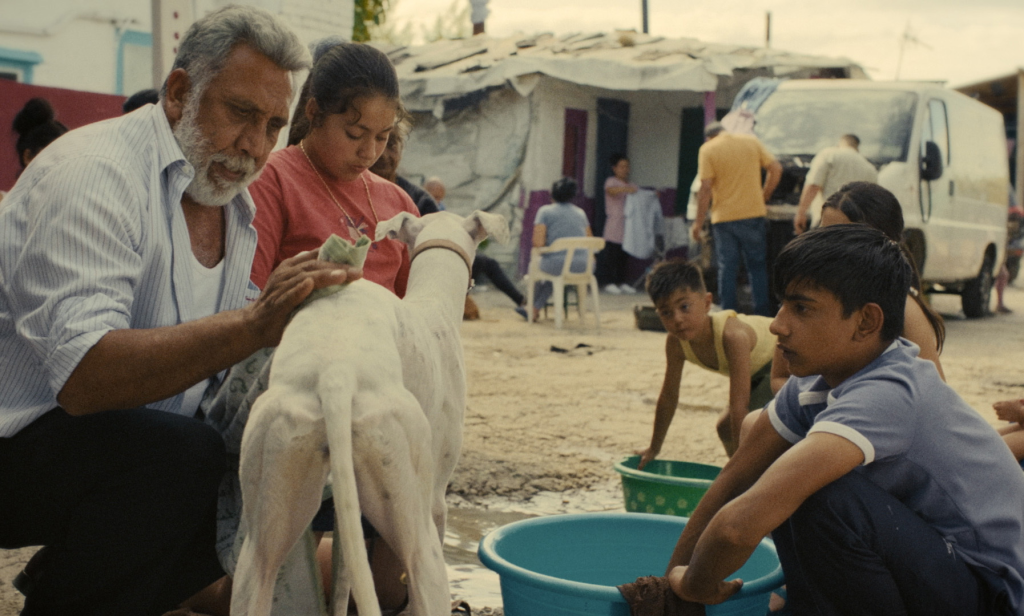The Semaine de la Critique (or Critics’ Week) at the 2025 Cannes Film Festival had plenty of unrecognized gems. Every year, it tends to happen: this sidebar of the acclaimed festival often loses its spotlight to the main competition films and their buzzy titles featuring big stars. But some great filmmakers have emerged from this section. Of course, there are some misfires; yet, the surprises tend to be more significant since fewer people are discussing them. In this capsule review piece, I have selected one hidden gem and two films that, unfortunately, didn’t meet their potential: Kika (by Alexe Poukine), Love Letters (by Alice Douard), Sleepless City (by Guillermo Gallo).

Kika (Directed by Alexe Poukine)
For her first narrative feature film, actress and director Alexe Poukine sought to create a project that resonated deeply with her, more so than any of her previous work. Hence, the creation of Kika, a film about female empowerment, grief, and the harsh realities that sex workers face in their daily lives, is presented through a dramedy tone that is way too breezy to function properly against the themes being tackled. The film begins at a rapid pace, where love, disillusionment, rekindling, and death occur all within ten minutes. Kika (played a charming and charismatic Manon Clavel) helps people with their housing and tenant problems, alleviating their stress and liberating them from chaos. Yet, in her time of need, nobody is there for her.
After one of her shifts, Kika stumbles upon a man (Makita Samba) in a bike shop, where a meet-cute scenario develops. Clavel and Samba’s chemistry is palpable; the two of them click on all cylinders, to the point where you can build a rom-com just with their scenarios alone. But, as previously mentioned, there’s more to Kika than this romance. They fall in love quickly and begin an affair. In the next scene, she leaves her partner for him. And in the very next scene, he passes away in an unshown accident, leaving Kika, who’s pregnant with her second child, and her daughter burdened with grief and melancholy. All of that information was presented to the viewer in a disorganized and careless manner. I was utterly baffled by how these key incidents in Kika’s life were presented, as if they didn’t matter. And they do.
These moments in her life pave the way for the film’s crux, where Kika must find ways to make ends meet while mourning the loss of a person with whom she had thrown her life away. Poukine does not explore this theme to its potential, as the focus is now on Kika becoming a sex worker, in secret from her parents and ex-husband, to make ends meet. Poukine switches gears, where the tragic tone of the first act is dismissed throughout the rest of the film to give way to comedy, which mostly fell flat. Even if Clavel tries to elevate the weak script with her charm and charisma, these comedic elements do not help Poukine tap into the contemplative side of Kika’s arc of upheaval and grief. Any attempt is undercut by gags that do provide brevity–and in a festival that has many dark, brooding, and sad pictures, it stands out–but they do not work for the film.
Grade: D

Love Letters (Des preuves d’amour, Directed by Alice Douard)
Love Letters (Des preuves d’amour) by Alice Douard tells a story that, by this day and age, has been told countless times, but it is truly important and impactful. The film follows Celine (Ella Rumpf, a talented French actress whom I’m fond of because of her stellar work in Julia Ducournau’s Raw) and her wife Nadia (Monia Chokri), who will give birth to their long-awaited daughter, a gift they have been asking the gods for plenty of times. And now it is at arm’s length, filling them with plenty of joy but also worry, as the role of being a caretaker gives them more responsibilities and the emotionally draining laws that have her reaching out to estranged parents.
Because IVF was illegal in France during the film’s setting, Celine must ask the people in her life for letters explaining why she would be a great mother and caretaker to adopt her own child, hence the reunion with her mother. Douard gives us many scenes where Celine and Naida go through the ups and downs of this process, and their devotion, with moments of joy, sadness, and frustration being spread across them. Although the story’s framing is uninspired, resembling one of the many French dramas offered out of competition, with little adventurousness behind the camera, Love Letters thrives due to Rumpf and Chokri’s respective performances and palpable chemistry.
The two bounce off each other quite nicely. The respect and devotion their characters have are felt in each scene they share. Rumpf and Chokri focus on paving a way into their characters’ hearts, which gives Love Letters an honesty and rawness necessary to tap into the crucial nature of why this specific perspective of this already told tale must be shared with us. While the filmmaking is minimal, Rumpf and Chokri are the ones who help you connect through the quietness of the canvas. Douard may not showcase the best of her directorial abilities, nor does cinematographer Jacques Girault. Still, the French director manages to let her actresses take the spotlight for the film’s entirety.
Grade: C+

Sleepless City (Ciudad sin Sueño, Directed by Guillermo Galoe)
Following the same ideas he planted in his short film Even Though It’s Night (Aunque es de Noche), Spanish filmmaker Guillermo Galoe brings us Sleepless City (Ciudad sin Sueño), a tale set in La Cañada Real, one of the most significant illegal shanty towns in Europe, located in the outskirts of Madrid. We follow Tonino (Fernández Silva), a fifteen-year-old boy who wanders the world with great curiosity, filming everything around him, alongside his best friend Bilal (Bilal Sedraoui), with his phone to capture the highs and lows of living in La Cañada. His family of scrap dealers tries their best to make ends meet, considering the circumstances, as Tonino follows his grandfather around while he conducts his business.
There’s an innocence to Tonino, seeing everything with a new light–from the low points of his living condition, he sees the joys in it, the small things that don’t fix his problems, but bring him happiness. Galoe provides many shots of Tonino’s surroundings, taking the time to have the audience look at this world, so distant from us, without ever delving into poverty porn or something of a similar vein. But things come crashing down with a demolition company closing in on them, and Bilal leaves La Cañada to live in another place because things have become too complex for his family. The effects of modernization and economic struggle are ripping his reality apart.
This creates a shift; Tonino dreams of a new life, and a change of location might do it, but there’s also a resentment towards leaving behind the place where he grew up–his roots are there, and a difficulty in distancing himself from it causes an internal struggle. Does he fight for this land with an uncertain future, or head to the more aspiring unknown? Galoe treats this story with sheer authenticity and understanding. He has covered La Cañada before, so Galoe has a more personal connection to the location and its people, which lends Sleepless City the honesty and sincerity needed to move the viewer without the need for over-dramatization. This story, and Galoe’s approach, reminded me of Carla Simón’s Alcarràs, where a family in the Catalan countryside struggles against a demolition company that wants to build solar panels on their farm’s land.
Both offer very humanist looks into the daily lives of people on the verge of losing the place they call home, and with that, ripping away the identity and culture of the place. While these are two different perspectives, from two very different societal classes, Simón and Galoe’s films depart from the same point, both directors being frustrated with Spain’s agrarian and modernization crisis, which causes difficulties for hundreds of families. The lens is filled with empathy and lament for those who have gone through these drastic changes. It might be a minor work in the grand scheme of the Cannes festival circuit. However, Sleepless City and its emotional grievances are still felt to a considerable degree, with Galoe presenting himself as a director to watch in Spanish cinema.
Grade: B





